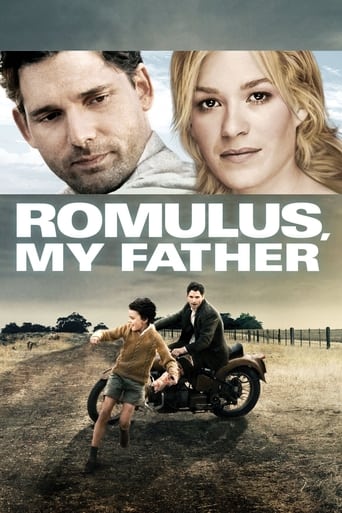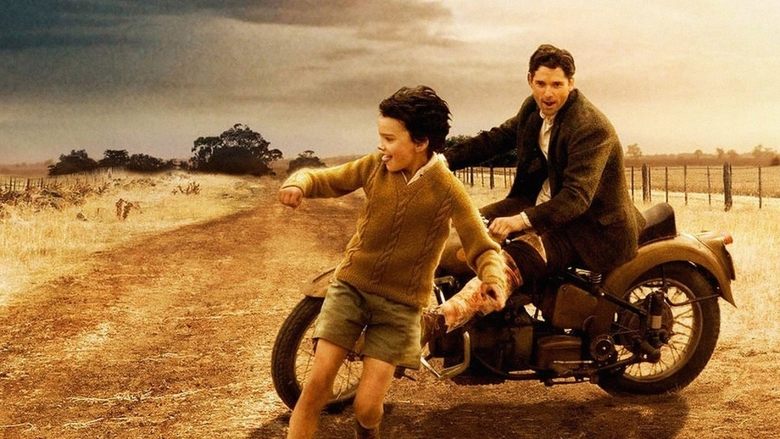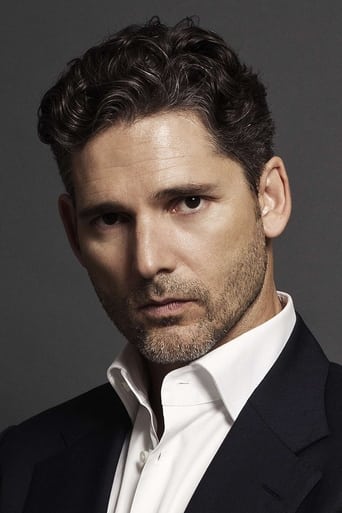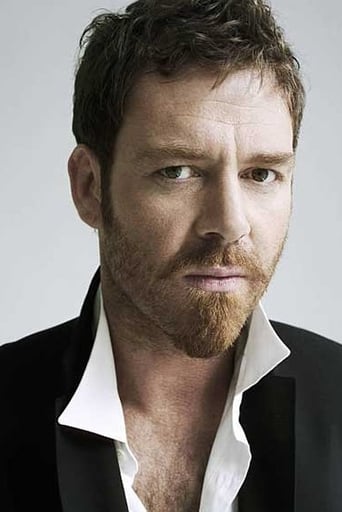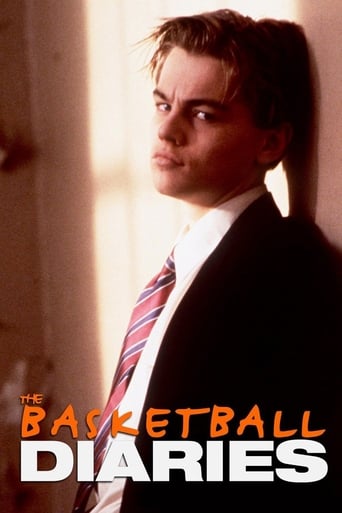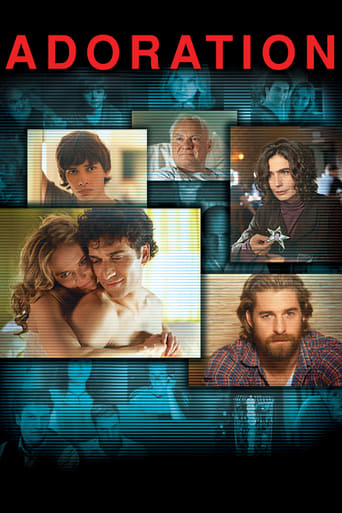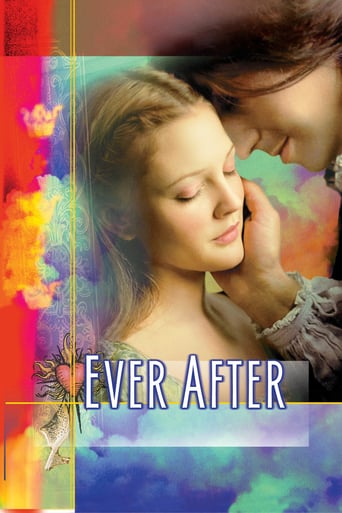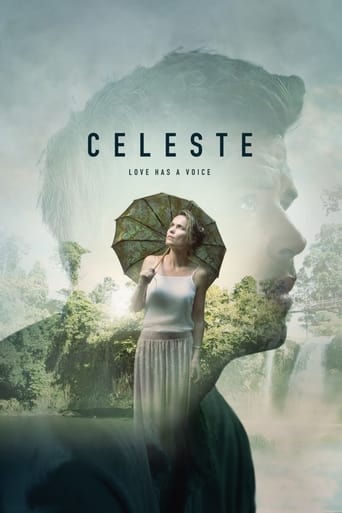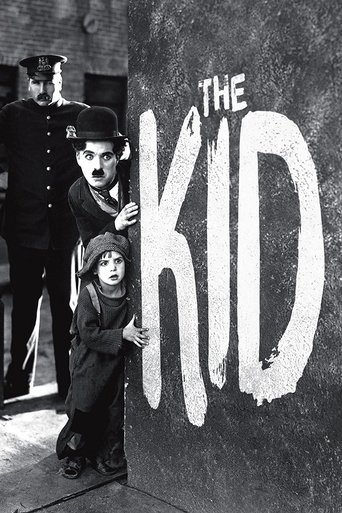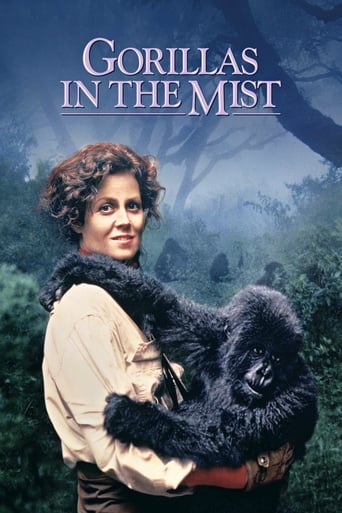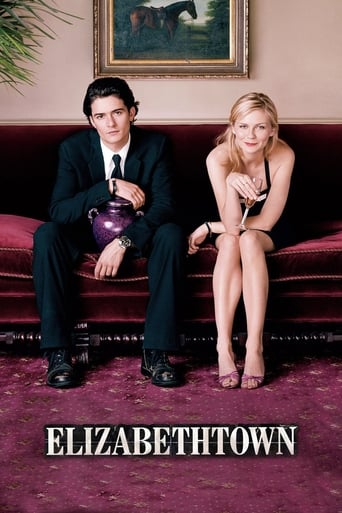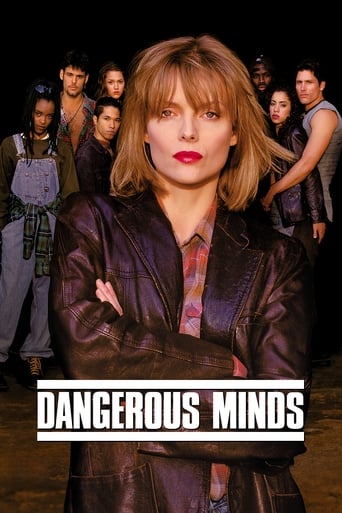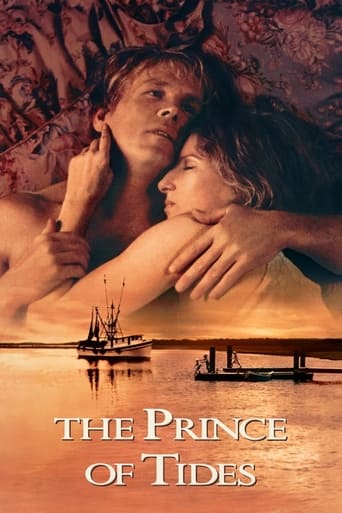Romulus, My Father (2007)
The story of Romulus, his beautiful wife, Christina, and their struggle in the face of great adversity to bring up their son, Raimond. It is a story of impossible love that ultimately celebrates the unbreakable bond between father and son.
Watch Trailer
Free Trial Channels
Cast


Similar titles
Reviews
the audience applauded
Fantastic!
It's simply great fun, a winsome film and an occasionally over-the-top luxury fantasy that never flags.
Just intense enough to provide a much-needed diversion, just lightweight enough to make you forget about it soon after it’s over. It’s not exactly “good,” per se, but it does what it sets out to do in terms of putting us on edge, which makes it … successful?
An astute view of a very unusual man and his relationships with his wife, son, and friends, Romulus, My Father contains a film-making mystery for me. While watching this excellent film, I kept asking myself how a boy of only eleven would be able to perceive situations and follow through with actions of someone much older. Having taught numerous eleven year old boys during my career, I found the thoughts and actions of Raimond extraordinary. I put it down to Raimond being a very bright child with wisdom beyond his years. I now find that the real Raimond Gaita was born in 1946, so he would have been fourteen to seventeen years of age during the time of the story rather than the ten to thirteen year old depicted in the film. It is beyond my comprehension why the director chose a younger boy for this part.Romulus is an Eastern European immigrant striving to make a life for himself and his son in 1960's Australia. He ekes out a meager existence working a small farm and making wrought iron furniture. It is his dream to earn enough to send his son, Rai to private school. Romulus's canon could be "Don't Make Waves" as he perpetually seeks calmness and compliance. This is shown is a small way when he is addressed as "Jack" at a local restaurant. Romulus explains to his son the "Jack" is his Australian name as the locals would be uncomfortable with his foreign name.Romulus's greatest tolerance comes in his relationship with his wife, Christina. We find that she lives in Melbourne with another man and chooses to occasionally visit her husband and son. She is welcomed by her husband whenever she chooses to visit, and he even quietly accepts that she has had a child with another man who was a good friend to Romulus. In one of the reviews of this film I read, the writer compared Romulus with a saint. No matter the metaphor used to describe him, he certainly behaves in a way not expected of a man whose wife totally rejects his love.During all this, Rai continues to cherish his mother and even spends time during vacations caring for his half-sibling as well as his mother who suffers bouts of severe depression.Romulus has a very good friend from his mother country, Hora who visits often and offers whatever emotional support and advice possible. Hora also acts as somewhat of a surrogate father for Rai as Romulus is often detached and emotionally distant. Hora is embarrassed by the fact that it is his brother, Mitru who is the father of Christina's second child and this causes a rift between the brothers.The acting in this piece quiet and understated and superbly portrays these emotionally bound people.Eric Bana shows Romulus as a kind-hearted but emotionally closed man who is placed in a situation without a solution. Far more than half of his performance is conveyed through facial expressions and body language, and these leave no doubt as to the storm of emotions boiling in this tortured man.Christina is given her bi-polar life expertly by German actress, Franka Potente who shows us a woman whose highs and lows make her a fascinating and irresistible character.Best friend, Hora is portrayed with strength by Marton Csokas, and his weak-willed brother, Mitru, is given life expertly by Russell Dykstra.Even though he is way too young for the part, Kodi Smit-McPhee gives a memorable performance as Raimond. His talent is clear, but I still continue to be vexed by the fact that the real Raimond was considerably older during the actual events depicted in this film.Raimond Gaita became a very successful man which is a tribute to the strength of the human spirit. This film is his story, and it expertly shows the genes of strength, moral character, and emotion contributed by his parents as well as the leveling love and maturity given by his surrogate father - all combining to succor the growth of a boy into a man of worth.
I doubt if Hollywood could ever make a film like this. The photography was beautiful, and the characters were excellent. The most striking feature was the way the story was constructed - often without dialog. The languid pace gave a pastoral view of a time in post war Australian history, when migration was so important to national growth. Many 'New Australians' would identify with the plight of this family. It was so true to life - not relying on any formal 'formula' plot, but told as it happened with all the inconsistencies of real life. Anyone looking for police chases, explosions, or over the top effects should look elsewhere. This film is for connoisseurs of fine films. It takes its time to unravel the subtle story of a man desperate to find love, but betrayed by his wife, his overseas girl-friend, and his brother. Only his son stays loyal to him, and he finally understands what really matters. It is not the stuff of daydreams, but the presence of people in his life who really matter, that make the difference. If you love fine films, this is 'must see' material.
In the autobiographical coming-of-age tale "Romulus, My Father," Eric Bana, of "Munich" fame, plays an impoverished German émigré struggling to raise his son, Raymond (Kodi Smit-McPhee), in rural 1960's Australia. The major obstacle to the family's stability and happiness is his wife, Christina (Franka Potente), who flagrantly violates her wedding vows by shamelessly shacking up with other men. Despite her highly unconventional behavior, Romulus refuses to grant her a divorce, masochistically torturing himself in the vain hope that she will one day return to him. It is, unfortunately, the good-hearted and good-natured Raimond who must bear witness to all this marital turmoil - and it is his memoir that serves as the basis for the movie (Raimond Gaita would later grow up to be an author).Even though I admire "Romulus, My Father" for what it is trying to do, I can't honestly say I enjoyed it, for while the film has some fine performances and serious intentions going for it, these simply aren't enough to counteract the dour storyline and funereal pacing, which leave the audience as despairing and depressed as the people on screen. A serious slice-of-life drama is one thing, but this unremittingly downbeat wallow in adultery, insanity and multiple suicides (let alone attempted suicides) is something else again.
Raimond Gaita is not a name widely known to the world outside Australia where he serves as a professor of philosophy, writing extensively on 'skepticism (moral, of other minds and of the external world), on the philosophy of mind and the philosophy of psychology, on aspects of political philosophy (collective responsibility, the role of moral considerations in politics, genocide and the alleged uniqueness of the Holocaust), on education (the nature of teaching as a vocation, the role of love in learning and the plight of the universities) and on Wittgenstein's philosophy of mind and language'. After this filmed version of his memoir ROMULUS, MY FATHER, he may well gain a larger audience. This low budget film uses fewer words than silences and actions to depict the childhood of Gaita in the period around 1960. For many it may seem an aimless, prolonged, sad film, but for others it will deliver a life force in a sensitive child that is indomitable. Romulus Gaita (Eric Bana) immigrated to Australia from Yugoslavia with his wife Christina (Franka Potente) and their son Raimond (Kodi Smit-McPhee). Romulus works as a blacksmith and farmer to support his family: Christina is not happy with the confinement of marriage and motherhood and finds frequent reasons to have promiscuous jaunts away from her small house and maternal duties. Romulus and Raimond are very close and find ways to exist without Christina, especially when Christina has an extended affair with a family friend Mitru (Russell Dykstra) and has a child by him. Despite warm support from Raimond and his best friend Hora (Marton Csokas), Romulus decompensates and his radical behavior results in his hospitalization in a mental institution. How Raimond's bond with his beloved father endures despite the endless tragedies that befall his 'home' provides the closure of this tender memoir. Nick Drake provides the screenplay from Gaita's book, Richard Roxburgh directs, Basil Hogios provides the sparse musical score for Geoffrey Simpson's magnificent cinematography of the desolate plains of Australia. But it is the solid performances by Eric Bana and Kodi Smit-McPhee as father and son that make this film so memorable. Grady Harp

